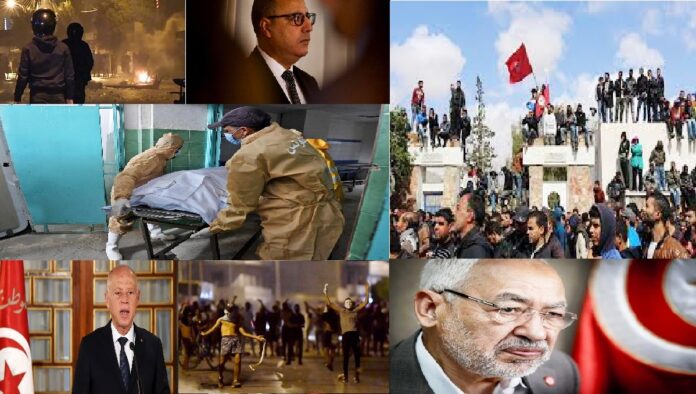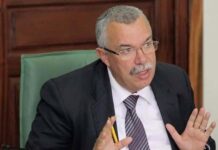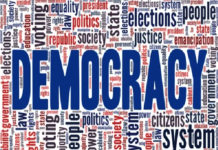In Tunisia in recent years, the people—citizens have come to internalize the fact that there is no state to provide them with the basics of a decent life, protects their lives from the danger of the pandemic, and guarantees them health care or other services and roles in which individuals exchange a share of their freedom with the state, which is supposed to be an entity responsible for lives and livelihoods in exchange for the people—citizens to obey the laws and general policies thereof.
The state is a geographical area that is subject to a system and institutions, to a device and mechanisms to run the daily affairs of individuals, organize the public space, establish the rules of coexistence, provide basic services without discrimination, guarantee the natural rights of individuals, and grant them a climate for emancipation. This is the state that Tunisians dreamed of: a just state that guarantees them dignity and equal rights and duties. Unfortunately, with the succession of disappointments and the failure of the post-2011 system to respond to the demands, the state has become a mere “political system” in the collective mind of Tunisians.
In fact, the Tunisians did not stop believing in the state, but rather they disbelieved in the post-2011 system of government, which makes the individual lose hope and does not expect anything from the state in which he became certain after 10 years of the revolution that the priorities and preoccupations of the political class, especially those who were involved in government during the past years have been totally contradictory to the expectations of Tunisians.
The post-2011 system of government headed by the triumvirate of power, the presidency, the government and the parliament has completely cut off from the reality of Tunisians and their political, economic and social crisis. Today, with the epidemiological situation and the dangerous health context experienced by the country, which seems to be heading towards a health disaster, this separation from reality continues in the ruling system.
The events that are constantly reported from Parliament, which is the legislative wing of the post-2011 system, have been shocking and disgusting, for example, the scandalous violent attack on MP Abir Moussi, who herself represents the face of uncivilized violent discourse reveals that the Tunisian parliament has become an unsafe space and does not represent the voice of the people.
The ruling majority led by the Ennahda Movement ignores the violence perpetrated, for example, by the Dignity Coalition for reasons related to political positioning, mainly to secure the position of Parliament Speaker for its Cheikh Rashid Ghannouchi.
In order to guarantee positions, violence has been tolerated from the beginning, and political and legal protection has been provided for its perpetrators. Therefore, violence has escalated under the dome of the Tunisian Parliament, which has become one of the institutions least trusted by Tunisians.
Political conflicts and calculations have made the legislative authority, i.e. Parliament, an institution with a contradictory, ridiculous and disgusting discourse, and everything that comes out of this institution is in the service of the political parties and centers of influence, not in the service of the people who have the original authority.
This does not differ with the two heads of the executive branch. The current government has personified weakness, confusion and lack of political vision. It is a government whose president chose from the beginning to be preoccupied with ensuring his political future. To achieve this, the latter lined up with a parliamentary majority against the presidency.
This caused a rupture at the top of the pyramid of the executive authority, which in turn led to a total paralysis in the system of government and the functioning of the state in a period in which epidemiological indicators rose and the economy deteriorated in an unprecedented manner and in which all the values of the state of institutions collapsed and social tension escalated, which heralds the catastrophe!
As for the second head of the executive authority: the President of the Republic. Since the beginning of his tenure, he has been keen to declare that he is on a different planet, so he isolated himself in the Carthage Palace and chose a “pure” approach that eventually led to many political mistakes and miscalculation of priorities. Today, the President of the Republic’s concern and priority has become to amend the constitution and change the system of government, rather than managing urgent and immediate issues that require a minimum level of coordination between the institutions of governance and the components of the political system.
The complete break between the post-2011 regime and the Tunisian reality and its entitlements has revealed its inability to achieve political stability, respond to Tunisians’ expectations, carry out major reforms, and harmonize legislative and regulatory texts with the Tunisia revolution.
This system has utterly failed to understand the Tunisian reality and to work towards realizing the promise of the welfare state. It is a system that has only succeeded in fueling political conflicts and rivalries that are looking for positioning and achieving partisan and factional gains and benefits.
The “idea” of the state has been destroyed! Tunisians are now declaring their despair of their country and expressing their dreams of fleeing from it. All this is because of the political actors who failed to realize that they had led the country to ruin!











